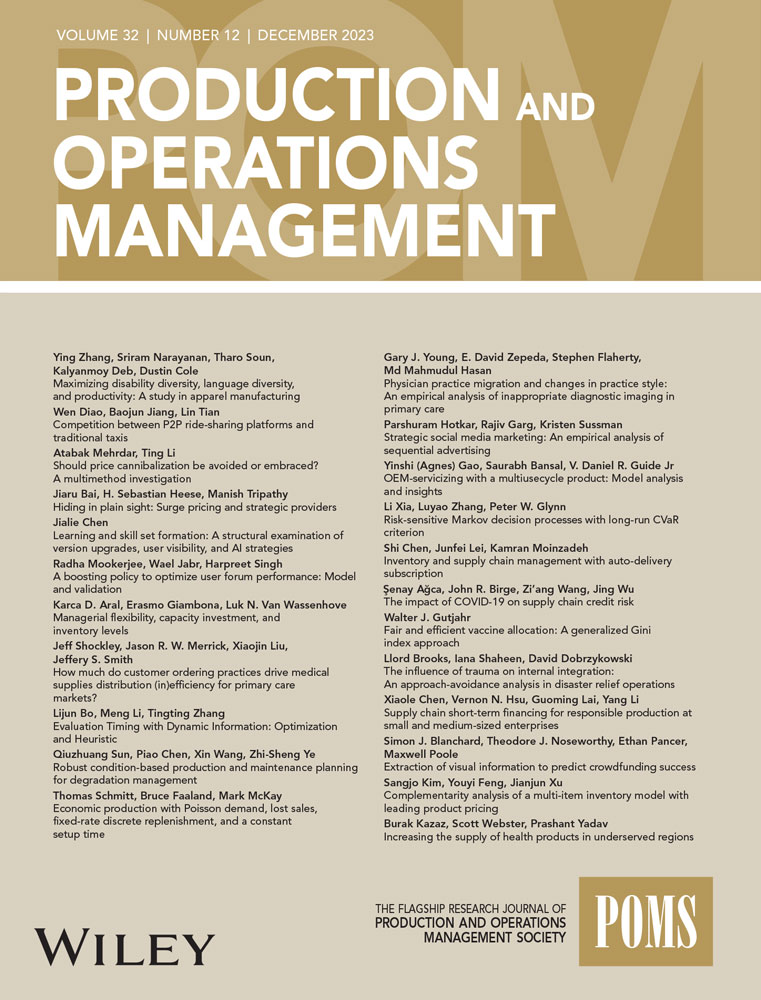Information Transparency With Targeting Technology for Online Service Operations Platform
IF 4.8
3区 管理学
Q1 ENGINEERING, MANUFACTURING
引用次数: 0
Abstract
Social technologies have enabled the emergence of online platforms that provide offline service consultations and recommendations. In this environment, economic inefficiency arises when customers are not fully aware of their horizontally differentiated preferences. With its expertise or data dominance, a platform can be more informed about customers’ hidden preferences. We focus on an instrumental social technology, that is, targeting, which is a type of data-driven personalized information provision to manipulate customers’ beliefs about service quality. We propose a Hotelling model wherein customers are sensitive to the delays for service while making Bayesian belief updates based on a platform’s recommendations. When customers self-select their favorite service, their choices impose negative externalities through congestion and welfare loss. Our results indicate that service recommendations allow customers to navigate toward the more appropriate service, thus improving matching efficiency, reducing congestion costs, and enhancing aggregate customer welfare. We further identify the role of “information transparency” and study how the platform should strategically release information by making personalized service recommendations to customers. Interestingly, when a customer-centric platform maximizes aggregate customer welfare, we identify the “value of opaqueness” by strategically withholding service recommendations from a subset of customers and notice that this effect is more pronounced for a profit-seeking platform. Our results offer a better understanding of information transparency policies in the joint design of service recommendation systems and pricing mechanisms.在线服务运营平台的定向技术实现信息透明化
社交技术使提供线下服务咨询和建议的在线平台得以出现。在这种环境下,如果客户不完全了解自己横向差异化的偏好,就会出现经济效率低下的问题。凭借其专业知识或数据优势,平台可以更多了解客户的隐性偏好。我们将重点放在一种工具性社交技术上,即目标定位,它是一种数据驱动的个性化信息提供,可以操纵客户对服务质量的信念。我们提出了一种 Hotelling 模型,即客户在根据平台推荐进行贝叶斯信念更新的同时,对服务延迟也很敏感。当客户自主选择他们最喜欢的服务时,他们的选择会通过拥堵和福利损失带来负外部性。我们的研究结果表明,服务推荐能让客户选择更合适的服务,从而提高匹配效率,降低拥堵成本,提高客户的总体福利。我们进一步确定了 "信息透明 "的作用,并研究了平台应如何通过向客户提供个性化服务建议来战略性地发布信息。有趣的是,当以客户为中心的平台实现客户福利最大化时,我们通过策略性地拒绝向部分客户提供服务建议来识别 "不透明的价值",并注意到这种效果在追求利润的平台上更为明显。我们的研究结果有助于更好地理解服务推荐系统和定价机制联合设计中的信息透明政策。
本文章由计算机程序翻译,如有差异,请以英文原文为准。
求助全文
约1分钟内获得全文
求助全文
来源期刊

Production and Operations Management
管理科学-工程:制造
CiteScore
7.50
自引率
16.00%
发文量
278
审稿时长
24 months
期刊介绍:
The mission of Production and Operations Management is to serve as the flagship research journal in operations management in manufacturing and services. The journal publishes scientific research into the problems, interest, and concerns of managers who manage product and process design, operations, and supply chains. It covers all topics in product and process design, operations, and supply chain management and welcomes papers using any research paradigm.
 求助内容:
求助内容: 应助结果提醒方式:
应助结果提醒方式:


